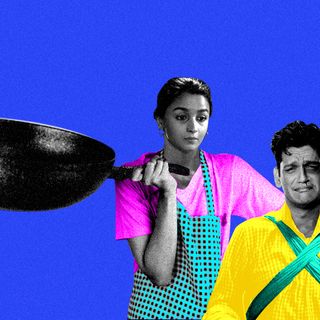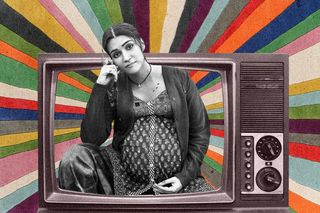
Can We Move On: From the Trope of the Woman Who Is Revered, Glorified for Refusing to Have an Abortion
When women are put on a pedestal for choosing not to abort, and vilified for having one, the idea that they have free will is an illusion.

In Can We Move On, we revisit old tropes and question whether they have any remaining cultural relevance.
In mainstream Bollywood, aborting a fetus is akin to committing murder. This is where on-screen stories faithfully resemble the social taboos of real life. A woman who chooses to see her pregnancy through to completion — no matter the circumstances — personifies righteousness. They are treated almost as role models to everyone of childbearing age. Conversely, women who opt for abortion are treated as though they aren’t humans, but monsters instead.
When women are put on a pedestal for “choosing” not to abort and vilified for the opposite, reproduction doesn’t remain a “choice” anymore — diluting the notion of free will when it comes to abortion.
In 2021’s Mimi, Kriti Sanon played the titular character of a surrogate mother. But even after the biological parents of the fetus, who had hired her and were paying for her medical care, ask her to abort upon finding out that the child she gives birth to might be disabled, she continues her pregnancy — despite its impact on the career she was, until then, willing to go to any lengths for. Similarly, in 2019’s Good Newzz, Deepti and Monika, played by Kareena Kapoor Khan and Kiara Advani, choose not to opt for an abortion even after discovering that they’d accidentally been impregnated by the sperms of each other’s husbands, and being visibly disgusted by it. In the respective narratives of Mimi and Good Newzz, the female leads’ decisions to not abort their fetuses, propels them to moral superiority.
On the other hand, in 2004’s Aitraaz, upon realizing she’s pregnant, Sonia (played by Priyanka Chopra) decides to opt for an abortion because she didn’t want to have kids at that stage in her career. She’s immediately deemed a vamp in the narrative. “What does the film do to Sonia? It makes her the villain and clothes her in all sexist stereotypes. After learning about her decision to abort the fetus, a selfish, misogynistic Raj [played by Akshay Kumar] immediately leaves her,” notes an article in The Quint.
Naturally then, it doesn’t come as a shock when in 2016’s Sultan, Aarfa (Anushka Sharma) chooses against it, despite knowing it cost her a career in wrestling that she had been tirelessly training for until then.
The link between pregnancy and womanhood is reflective of the patriarchy rooted in Indian society. And through this trope, the righteous woman on screen echoes the anxiety around allowing women to claim agency and ownership of their bodies. In doing so, the trope worryingly eliminates the space for the person to air their anxiety, concerns, and credible challenges that may come with pregnancy.
Related on The Swaddle:
Body Matters: Navigating Abortion in India
This judgment is often the “most traumatic thing” about getting an abortion, Rajvi Desai had written in The Swaddle in 2020. Summing up her interview with M.S., then 26, Desai wrote, “[M.S.] had to track down a doctor far away from her neighborhood and endure judgment from nurses, who interrogated her about her marital status and berated her for having sex. The second time [she had an abortion], M.S. encountered a similar situation with a radiology lab technician, who tried to convince her to keep the child, coaxing her to look at the image of the cells and feel empathy for it.”
M.S.’s experience sounds eerily similar to that of Deepti’s from Good Newzz. While performing an ultrasound, her doctor Dr. Joshi, played by Tisca Chopra, guilt-trips her about aborting her fetus by making her listen to its heartbeat, calling it a “blessing” and a “miracle,” and asking her if she still feels up to “killing” it? Being emotionally manipulated thus, unsurprisingly, she didn’t anymore. Instead, refusing to abort, she tells her husband, “We don’t want to be murderers, right?”
This guilt is often internalized as shame and self-doubt. In 2005’s Salaam Namaste, Ambar (played by Preity Zinta) actually corrects her boyfriend Nikhil (played by Saif Ali Khan) when he tells her, “Get rid of it… let’s kill it!” She says, “The word is abortion… Don’t say ‘kill it!'” This was in stark contrast to the character Zinta played in 2000’s Kya Kehna, where she bore the stigma of being an “unwed mother.” But soon enough, in Salaam Namaste, after a brief detour to her gynecologist’s office, where she witnesses the ultrasound of a woman with advanced pregnancy, she changes her stance, telling Nikhil, “I can’t kill it.”
Despite the spin Bollywood tries to lend to it, whether or not to abort isn’t one of morality. Bollywood’s anti-abortion leanings may suggest otherwise, but unlike in the U.S., abortion isn’t per se criminalized in our country, which is a matter of pride for many Indians. Some of them might even argue that it doesn’t really matter that Bollywood refuses to keep up with the times since the law itself is progressive. But what our proud country-people often forget is that “access to abortion is a social and medical issue as much as it is a legal one… the judgment of aborting a child, or having pre-marital sex, is humiliating and pervasive,” as Saumya Kalia wrote in The Swaddle earlier this year.
Moreover, the Medical Termination of Pregnancy (Amendment) Act, 2021 — touted as a liberal statute — gives doctors, and not women, the final say in whether or not their pregnancies are to be terminated. In other words, it’s not a “right” women have. As such, brainwashing isn’t the only risk an anti-abortion doctor poses. “To me, the provisions [of the 2021 statute] are progressive in a paternalistic, victimhood kind of way… Doctors will bring their own biases, personal moralities, and values and they may refuse it even if it’s 20-24 weeks,” Suchitra Dalvie, a gynecologist and coordinator for Asia Safe Abortion Partnership, told IndiaSpend.
Related on The Swaddle:
When we depict only “righteous” women on screen, without carving space for real-life trepidations, the impact off-screen is one of systemic alienation. Women who choose to abort the fetus are women engaging with wrongness, and if they proceed, the abortion must be discreet or hidden. It’s far from shocking, then, that despite abortion being legal in India, as many as 78% of the total number of abortions Indians had in 2015, were not performed within the confines of health facilities, according to a report by The Lancet.
Surgical abortions performed without medical supervision can be highly unsafe posing risks of infection, hemorrhage, and accidental damage to the reproductive organs. In many cases, the abortion can remain incomplete too, which can cause uterine rupture, multi-system organ failure, and even death. Medical abortions — performed by popping a set of pills — might seem safer comparatively, but without a medical practitioner to assess if is allergic to the pills, or has an ectopic pregnancy, it can lead to complications too.
Thankfully, there is a way to avoid endangering people’s health thus. It’s a rather simple one too: moving on from movies that treat abortion as “murder” and hail women for steering away from it, rather than respecting their individual agency. Perhaps, then, rather than convincing people otherwise, or downright denying their request for an abortion, doctors will guide people through the process safely. And, maybe, instead of wondering “Log kya kahenge?” (What will people say?), pregnant people can approach abortion clinics with the nonchalance one would otherwise associate with procedures as routine as a blood test. In case complications arise, they probably wouldn’t hesitate to tell their families either.
Granted, that vision is rather utopian. Bollywood changing its stance on abortions will, in all probability, not have as big of an impact either. Nonetheless, given its extensive base of viewers, it still needs to change due to its ability to mold people’s perceptions. Movies may not be able to wave a magic wand and make people pro-abortion, but that doesn’t mean they should continue, unfettered, to manipulate audiences into being anti-abortion.
Devrupa Rakshit is an Associate Editor at The Swaddle. She is a lawyer by education, a poet by accident, a painter by shaukh, and autistic by birth. You can find her on Instagram @devruparakshit.
Related


The Multiverse as a Storytelling Device Fails to Capture the Anxiety of the Present. Where Does Fiction Go Next?
